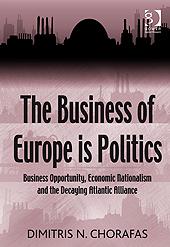Submitted by literature on

“The Business of Europe is Politics” by Dimitris N. Chorafas, is a book that describes the particular nature of the European mixture of business and politics, it explains how that mix influences trade and relationships between continental Europe and the UK with USA, Russia and Asia. Dr Chorafas explains and heavily critiques organization and practices of European Union, conflicting interests in the Europe and its lack of any business plan.
At the very beginning of his book, author states that contrary to the majority of people believe, or want to believe, the European Union has been in a constant state of decay and impotency from its very beginning. It failed to deliver almost all its promises in any satisfactory way, and worst of all instead of promoting unity and cooperation in Europe, it become a battlefield of conflicting interests of various members. The author even states that European Union in the present time and its members are in the state of declinism, which is a state in which institutions of a state and its social structures are crumbling and cannot be reformed.
Dr Chorafas maintains, that there are many causes for European Union’s current state, but the most important are: lack of real cooperation between states, EU’s uncontrolled enlargement, and decadency. Each of them is discussed in depth in the subsequent chapter of the book, all backed by facts and examples, which I shall cite in the following paragraphs.
According to the author, the European Union from the very beginning was plagued by conflicting interests of its members. Although its founders tried to work together to bring peace and prosperity to the Europe, their mediocre successors wasted all goodwill. Instead of cooperating they fought one another, so they can gain the benefits of the union but give nothing in return, especially any political power. This is illustrated by an example of what happened in 2007, when there was a big discussion over what to write on a grandiose birthday card intended to commemorate the European Union’s anniversary. The idea was to create a text that sums up the EU’s achievements. This caused disagreement because France wanted to give priority to social politics; Britain wanted to downplay references to euro; Poland insisted on mentioning communist oppression in Eastern Europe; and many states pressed for removing anything that may commit EU to a new or ambitious constitutional treaty. In the end the text was written in secrecy and signed only by the most important people in EU.
In order to create a true union all its members must resign from parts of their sovereignty. But not many would agree to let some distant, very bureaucratic and not transparent institution, such as the one in Brussels, govern over them. Especially when they have their own government and traditions. Author gave as an example Switzerland. Every decision there has to be approved by a referendums in every canton. As one of author’s friends said, “It cannot be that European law is higher than Swiss law unless the people agree to it”. This attitude is common for many countries, many of which are members of the EU. The net result is that there is a lot of overlapping jurisdictions all over Europe, and it very hard to make sense of.
This lack of cooperation may be a result of the uncontrolled enlargement. Too many countries were accepted into the EU in too short time. If twelve countries which created the EU could not reach agreement and cooperate economically and politically, it is impossible for 27 to achieve required level of cooperation. The example of the birthday card shows the result of this. As an another example relations between EU and Russia can be examined. Many countries from Eastern Europe consider Russia to be a threat. But almost all European countries buys resources from Russia. This results in constant disagreement on how to handle the relations, and when factors such as human rights in Russia are added, the net result is chaos instead of cooperation for the common cause and good.
Last cause of the decaying state of the European Union is its decadency. Author points that most, if not all, of the European Countries are more concerned with redistribution of goods and wealth instead of producing them. That is because people get used to high standard of living and do not want to change that. This caused the creation of huge entitlement programs which consumed huge amounts of money. To finance that countries had to raise taxes and take credits which are still growing, but nobody is concerned with paying them. As author points out, for many people its next generation’s problem.
As can be seen from above paragraphs, the most important ethical values for the author are cooperation, justice and fairness. Cooperation in this case means a democratic governance at all levels, a mutual respect, transparent decisions and an invitation to participate on all levels of EU governance, which currently is not practised. Justice means democratic and transparent rules of decisions at all levels, making laws and regulations understandable. And last but not least, fairness in this context can be understood efficient use of taxes for better infrastructure and economic growth instead of taking money from people to later waste it on pointless projects or give it back via some entitlement program.
By Michał Pawlak


